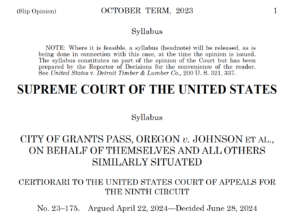 I always think of donuts when I hear Dunkin Donuts, but of course now it is just “Dunkin” and coffee is at the top of their product line. Hence the coffee cup to the left, because we are back to alternative milk products and the ADA.
I always think of donuts when I hear Dunkin Donuts, but of course now it is just “Dunkin” and coffee is at the top of their product line. Hence the coffee cup to the left, because we are back to alternative milk products and the ADA.
The last time I blogged about this subject was in March, just after the attorneys representing plaintiffs in a lawsuit against Starbucks decided that Florida wasn’t the ideal place for their lawsuit and decided to re-file in California.¹ A month and half later a similar lawsuit against Dunkin’ Donuts, also filed in California, was dismissed in part for failure to state a claim with respect to whether the lactose intolerant plaintiffs had a disability as defined in the ADA. Garland v. Dunkin Donuts LLC, 2024 WL 2808653, at *5 (N.D. Cal. May 31, 2024). The court granted the plaintiffs leave to amend and they will presumably either provide sufficient details to meet the Iqbal / Twombly test for plausibility in alleging a disability or give up because they are not in fact disabled. The latter is very unlikely, though a strategic dismissal in search of a better venue can’t be counted out.
This made me wonder just what allegation might be sufficient and so I poked around in the small world of litigation about lactose intolerance. My favorite use of the condition was one that isn’t really relevant here but was certainly creative. In Kral v. Temperato, 2014 WL 6083444, at *5 (E.D. Mo. Nov. 13, 2014) the plaintiff sued a Dairy Queen store because it did not meet the physical accessibility requirements in the ADA. Her disability was physical, but in the course of her deposition she apparently said she had not returned to the DQ store in question because, in part, of lactose intolerance. Seizing on this statement the defendants argued the plaintiff could not show a risk of future harm because she would not likely return to a store that featured dairy products. The argument was defeated by the plaintiff’s love of cheeseburgers, which was more than enough for the court to conclude she had shown a likelihood of return and therefore a likelihood of future injury.² Although it failed, the idea of using one supposed disability to defeat a claim based on a different disability is appealing.
More seriously, I did find some judicial authority for the limits on lactose intolerance as a disability. Garner v. Walker, 2024 WL 1177975, at *3 (E.D. Mo. Mar. 19, 2024) was a lawsuit about a prisoner who claimed he was mistreated in a number of ways, including being denied a special diet because of his lactose intolerance. The case did not involve the ADA definition of disability, but did include medical testimony about the extent to which lactose intolerance might limit the major life activity of eating and digestion:
Dr. Phillips also opined that according to UpToDate, an evidence-based online resource that is widely utilized by health professionals, it is recommended that patients with symptomatic lactose malabsorption should be advised that complete elimination of dietary lactose is not required and that restriction of their intake of lactose is often sufficient to treat symptoms of lactose intolerance.
This certainly suggests that most lactose intolerance, even when it causes symptoms, is more an inconvenience than a disability.
Lactose intolerance figured as well in Jackson v. Gordon, 145 Fed. Appx. 774, 776 (3d Cir. 2005)(unpublished). The question was whether the plaintiff had adequately alleged violations of the Eighth Amendment (cruel and unusual punishment) based on denial of a special diet. The Court of Appeals found that he had:
Jackson alleged that he is severely lactose intolerant and allergic to eggs, that he was given “inadequate meals,” that “in order for [him] to eat food, he has to get food from other inmates via a ‘transportation device,’ which is disgusting and unsanitary,” that “this denial of a therapeutic diet is taking a serious toll on his health,” and that he suffers “constant hunger” from the “lack of proper nutrition.”
This case was decided before Iqbal and Twombly, so the result might be different today, but it can at least be read to acknowledge the possibility that lactose intolerance can be a condition severe enough to limit the ability to eat and digest food. At the same time, the complaint was based on the unavailability of lactose free food, meaning there was no alternative for the plaintiff. In Title III ADA cases the plaintiffs can obtain nutrition in many ways that don’t involve lactose. In ability to eat may be a disability, but inability to eat one kind of food should not be.
The Veterans Administration has also dealt with lactose intolerance as a service related disability. In Williams v. McDonough, 2023 WL 4838120 (Vet. App. July 28, 2023) the Court of Appeals for Veterans the plaintiff claimed to suffer from lactose intolerance. His claim was denied because his service records showed only a single instance of abdominal distress and lactose intolerance is a chronic condition that would cause more than a single problem. The Court of Appeals remanded for further findings, holding that the hearing examiner failed to consider evidence that the condition was chronic. The Court never reached the question of whether the lactose intolerance rose to the level of being a disability. A similar result was reached in Vaughn v. Shinseki, 2013 WL 3944492, at *7 (Vet. App. Aug. 1, 2013), adhered to on denial of reconsideration, 2013 WL 6050859 (Vet. App. Nov. 15, 2013). The case was remanded with instructions that the veteran be provided an examination to determine whether he did in fact have lactose intolerance, in this case as a secondary effect of diabetes (which is undoubtedly a disability).
These probably don’t represent the full range of cases in which lactose intolerance has been litigated, but decisions before the 2008 ADA Amendments are no longer really relevant. I found no cases referring to medical evidence except Garner v Walker, and that case is consistent with what my own research found; that is, lactose intolerance is a term that covers a range of conditions, many or most of which are not disabilities. I’ll update this when the next round of milk alternative decisions are handed down.
++++++++++++++++++++++++++++++++++++++++++++
¹ See, Starbucks Again. As they say, if you don’t like Disney World, you can always try Disneyland. The Starbucks case is ongoing.
² I worked at a DQ in high school and agree that the cheeseburgers are worth going back for.


 In Loper Bright Enterprises et al v. Raimondo, Secretary of Commerce et al, Case No. 22-451 (June 28, 2024) the Supreme Court overruled Chevron U. S. A. Inc. v. Natural Resources Defense Council, Inc.,
In Loper Bright Enterprises et al v. Raimondo, Secretary of Commerce et al, Case No. 22-451 (June 28, 2024) the Supreme Court overruled Chevron U. S. A. Inc. v. Natural Resources Defense Council, Inc., In City of Grants Pass, Oregon v. Johnson et al, Case No. 23-175 (June 28, 2024) the Supreme Court, after a very long discussion, found that the prohibition on cruel and unusual punishment in the Eighth Amendment does not forbid cities from passing laws that prohibit public camping. The legal reasoning is simple. The Eighth Amendment covers what happens after a person is convicted of a crime, not what happens before. Thus, it does not cover what can be made illegal in the first place.
In City of Grants Pass, Oregon v. Johnson et al, Case No. 23-175 (June 28, 2024) the Supreme Court, after a very long discussion, found that the prohibition on cruel and unusual punishment in the Eighth Amendment does not forbid cities from passing laws that prohibit public camping. The legal reasoning is simple. The Eighth Amendment covers what happens after a person is convicted of a crime, not what happens before. Thus, it does not cover what can be made illegal in the first place. I should begin by acknowledging that this is an editorial, not news. The news is simple – Title II entities must over the next few years bring their websites and mobile apps into conformance with WCAG 2.1 AA. The question is whether requiring that is a good way to do what the ADA is supposed to do in terms of delivering equality of opportunity to those with disabilities.
I should begin by acknowledging that this is an editorial, not news. The news is simple – Title II entities must over the next few years bring their websites and mobile apps into conformance with WCAG 2.1 AA. The question is whether requiring that is a good way to do what the ADA is supposed to do in terms of delivering equality of opportunity to those with disabilities. There has been plenty of commentary about the new DOJ website accessibility regulations for Title II entities, which fall into the good news / bad news category typical of all regulations. The good news is they have adopted WCAG 2.1 AA as the technical standard, using a standard everyone is or should be familiar with. They have also given local governments a few years to comply, a much needed break that, if applied to Title III regulations, will put a real dent in abusive litigation. The bad news is that DOJ has decided to use a generally inflexible technical standard that, as any expert will admit, can never be met. Equally important, it has denied local government the option to use alternate conforming versions as a means of compliance despite WCAG 2.1 AA’s recognition that such versions provide equal access. I’ll start with the problem of using a technical standard and, in my next blog, talk about the alternate conforming version issue.
There has been plenty of commentary about the new DOJ website accessibility regulations for Title II entities, which fall into the good news / bad news category typical of all regulations. The good news is they have adopted WCAG 2.1 AA as the technical standard, using a standard everyone is or should be familiar with. They have also given local governments a few years to comply, a much needed break that, if applied to Title III regulations, will put a real dent in abusive litigation. The bad news is that DOJ has decided to use a generally inflexible technical standard that, as any expert will admit, can never be met. Equally important, it has denied local government the option to use alternate conforming versions as a means of compliance despite WCAG 2.1 AA’s recognition that such versions provide equal access. I’ll start with the problem of using a technical standard and, in my next blog, talk about the alternate conforming version issue.